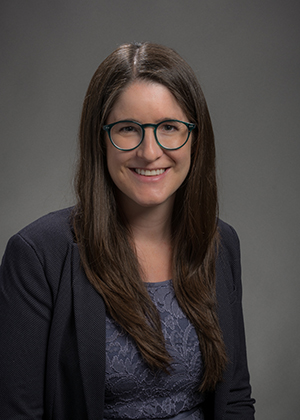
Prusynski receives $310,000 grant for home health care analysis

Assistant Professor Rachel Prusynski, DPT, PhD, NCS, has received a grant in the amount of $310,000 from the National Institutes of Health (NIH) for a project that will analyze home health care practices. Millions of homebound patients receive care from home health agencies, yet there's limited evidence on which delivery practices best improve outcomes based on clinical needs. This study, in partnership with BAYADA Home Health, will analyze data from 2020–2025 to identify how care practices like visit mix and intensity affect outcomes across different patient groups, aiming to inform more effective, patient-centered care nationwide.
This grant, a newly funded R03 from the National Center for Medical Rehabilitation Research (NCMRR), is more than just an award to Dr. Prusynski. She feels there is an incredible appreciation for her ongoing partnership with BAYADA Home Health, her health system partner for this proposal.
Dr. Prusynski has worked with BAYADA for two years, including under a previous Learning Health Systems (LHS) grant. Recently BAYADA recently nominated her for an LHS Innovation Award.
“I was actually a bit surprised to get the innovation award, because from my perspective as a health services researcher, the methods and approaches for our work with BAYADA thus far are pretty typical in our field. I think what was more innovative from BAYADA’s perspective was how I was able to apply a robust statistical approach to analyze their health system data,” says Dr. Prusynski.
Building on this work, Dr. Prusynski has also been accepted as a Learning Health Systems (LHS) scientist through LeaHD (Learning Health Systems Training to Improve Disability and Chronic Condition Care). Through this program, Dr. Prusynski will participate in didactic LHS training with a small cadre of LHS scientists from other institutions. She will also work as an embedded LHS scientist with Intermountain Health to apply LHS training to tackle health system research questions.
Dr. Prusynski is most excited that the LeaHD program includes didactic training for learning health system research competencies, along with the opportunity to partner with Intermountain Health.
Although the project officially begins in September, Dr. Prusynski is already holding weekly meetings with her mentors at Intermountain Health. She’s also meeting with stakeholders as she works to define a specific research project.
“One of the strengths of my LHS work so far has been helping my health systems partners understand how to apply more robust statistical methods to their data to produce results that are publishable in a peer-reviewed journal,” says Dr. Prusynski.
“I enjoy helping partners figure out the best way to ask a question so that they can draw more meaningful conclusions and be confident in their findings—especially if those findings influence operational care decisions,” she adds.
Dr. Prusynski believes that rehabilitation research is inherently interdisciplinary. Studies in learning health systems that evaluate delivery of care or outcomes have implications across many professions, including physiatrists, nurses, therapists, and business leaders. Dr. Prusynski argues that both developing a research question and applying the results requires collaboration across disciplines.
“I was so appreciative of how open they were to get meaningful findings, no matter what those results ultimately said. Specifically, it was so heartening that BAYADA signed an agreement allowing us to publish our findings no matter what, which demonstrates their commitment to improving patient care, disseminating findings to a broader audience, and a mission-driven approach to their work,” says Dr. Prusynski.
“Research integrity is important in learning health systems partnerships, and it is so important for researchers to partner with systems that don’t try to influence or discourage dissemination decisions,” she adds.
